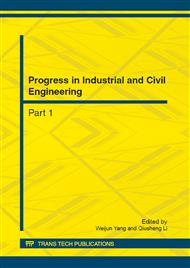p.3600
p.3604
p.3619
p.3624
p.3629
p.3634
p.3639
p.3644
p.3648
Experimental Study on Impact of Production Process Parameters on Rubber Asphalt Performance
Abstract:
In order to better master the production process and the road performance of rubber asphalt, the paper studied the influence law of mixing method, mixing temperature, mixing time and rubber powder content on the performance of rubber asphalt. The results show that all the indexes except the viscosity of rubber asphalt has little change with different mixing methods, and the rubber asphalt has the best performance under the high-speed stirring molding method but the worst performance under the high-speed shearing molding method. Meanwhile, the performance of rubber asphalt change visibly with different mixing temperatures, on which the excessively high or low production temperature has negative significance, so the optimal production temperature would be recommended as 180~200°C. Furthermore, the mixing time and the rubber powder content are the two critical factors which may greatly affect the performance of rubber asphalt, followed by the mixing temperature and the mixing method.
Info:
Periodical:
Pages:
3629-3633
Citation:
Online since:
October 2012
Authors:
Price:
Сopyright:
© 2012 Trans Tech Publications Ltd. All Rights Reserved
Share:
Citation:


